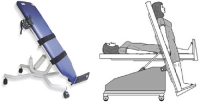Head Up Tilt Test (HUTT) is a way to find the cause of fainting spells. You lie on a bed and you’re tilted at different angles (from 30 to 60 degrees) while machines monitor your blood pressure, electrical impulses in your heart, and oxygen level.
It’s done in a special room called the EP (electrophysiology) lab.
Preparation
If you’re scheduled for a Head Up Tilt Test, you should:
- Take all your medications, as prescribed.
- Not eat or drink anything after midnight the evening before your test. If you must take medications, drink only small sips of water to help you swallow your pills.
- Bring a list of all your current medications, including the dose.
- Wear comfortable clothes to the hospital. It is best not to wear any jewelry or bring valuables.
- Plan to have someone drive you home after your test.
- If you have diabetes, ask how to take your medications, eat, and drink before the procedure.
Procedure
It usually takes an hour or two to complete. That may vary, depending on how your blood pressure and heart rate change and what symptoms you have during it.
Before the test begins, a nurse will start an IV. This is so the doctors and nurses may give you medications and fluids during the procedure if necessary.
You’ll be awake during the test. They’ll ask you to lie quietly and keep your legs still.
The nurse will connect you to four monitors. They are:
- Defibrillator/ pacemaker: This is attached to one sticky patch placed on the center of your back and one on your chest as a precautionary measure. The device allows the doctor and nurse to increase your heart rate if it’s too slow or send energy to your heart if its rate is too fast.
- Electrocardiogram, or EKG: It’s attached to several sticky electrode patches that are put on your chest. It provides a picture of the electrical impulses going through your heart.
- Oximeter monitor: A device is attached to a small clip on your finger. It checks the oxygen level of your blood.
- Blood pressure monitor: It’s connected to a blood pressure cuff on your arm and checks your blood pressure every so often.
How Will the Test Feel?
You may feel nothing at all, or you may feel like passing out. Some people do pass out. It is important to tell your doctor or nurse about any symptoms you feel.
As part of the test, your cardiologist may give you a medication called Isuprel or a nitroglycerine spray under your tongue. This may make you feel nervous or jittery. You may feel your heart beat faster or stronger. This feeling will go away as the medication wears off.
After the Test
Most likely, you’ll be able to go home. You should have someone drive you. Your heart specialist may change your medications after he gets your test results. He also may tell you that you need new medications or more tests or procedures.






Leave A Comment
You must be logged in to post a comment.